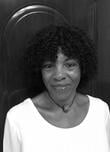
“enjambments,” a monthly interview series produced by the Academy of American Poets, will highlight an emerging or established poet who has recently published a poetry collection. Each interview, along with poems from the poet’s new book, and a reading by the poet, will be published on Poets.org and shared in the Academy’s weekly newsletter, as well as on its social media channels, reaching an estimated readership of 800,000+.
Publishers interested in featuring a poet’s latest release in “enjambments” should send PDF galleys only to [email protected].

enjambments interview: Alexandra Lytton Regalado
In many ways, Relinquenda explores masculinity—the men in my life and where we diverge and converge: being hard-headed, logic-oriented, stoic.

enjambments interview: dg nanouk okpik
Light is always in play in my writing. It is twilight or half-light [that] plays on the Arctic [and] this is how I want my poems read: in half-light; not in full light.

enjambments interview: Robin Coste Lewis
The words I’ve placed with each image attempt to kill history as we know it, to say, until we understand that these bodies contain legacies that are tens of thousands of years old, we know nothing.

enjambments interview: Peter Cole
Wit in Draw Me After—if that’s what it is—has nothing to do with cleverness and everything to do with quality of touch or tone, and linkage.

enjambments interview: Maggie Millner
Like me, the narrator of this poem is obsessed with analyzing formal categories.

enjambments interview: José Olivarez
The movement of the collection mirrors the movement of some of the poems. There are moments of joy and humor that are undercut by intense moments of pain and grief.

enjambments interview: Charif Shanahan
One of my interests in the book is to call into question what we believe we see, what we believe we know—racially, relationally—and one way the book does that is by deploying words (or morphemes) that have multiple and even contradictory meanings, as we do.

enjambments interview: Paisley Rekdal
You can’t translate everything about a poem, since not everything carries over perfectly (or even well) into the other language, so you have to make thoughtful decisions about what you are choosing to abandon.

enjambments interview: Mitchell Untch
A psalm is described as a sacred song or poem used in worship. By using the psalm as an antecedent, it opens the reader to a certain aesthetic feeling of pending enchantment.

enjambments interview: Oliver de la Paz
The “nothing” that comes up repeatedly in the sonnets and other poems deal with what I perceived as a lot of emptiness around me as I was growing up.

enjambments interview: Sinan Antoon
Poems are also prayers, but not to any god. Prayers to be shared among those who believe that a poem is a prayer.

enjambments interview: Taylor Byas
The movie itself represents family, community, home. It’s so incredibly nostalgic, and it’s so special if a reader feels that too. A reader’s recognition of that film creates a different and sacred space that the reader can then step into with me.

enjambments interview: Myronn Hardy
The first several drafts had one voice: that of an imagined member of the Central Park Five, the five Black teenage boys falsely accused and wrongly convicted of assault in New York City in 1989.

enjambments interview: Tatiana Johnson-Boria
The poem chronicles the speaker’s experience with trauma, while also serving as an ode to survival.

enjambments interview: Kelly Weber
As I was writing these poems, snakes emerged as sources of (queer) tenderness, vulnerability, exposure, and transformation close to the queer speaker’s heart.

enjambments interview: Wendy Call and Shook
The challenges are, I think, the attraction when it comes to translating poetry. I hope that part of what the unique trilingual format of How to Be a Good Savage provides the reader is a sense of the rich spaces between these languages.

enjambments interview: Jordan Pérez
My resistance to having light function in just one way helps create that atmosphere of change, of not knowing, of being unsure about who and what can be fully trusted.

enjambments interview: Armen Davoudian
I think that’s what I want from poems: not just to preserve what was there to begin with, but to supply what is missing. The poems I love best make loss tangible, like a shock of silver in a lover’s hair.

enjambments interview: Alison C. Rollins
Overall, I believe that poems function as compositions akin to musical scores, so I viewed myself as a composer looking to innovatively collaborate with readers in animating or bringing the poems to life.

enjambments interview: Maria Stepanova and Sasha Dugdale
In a sense, this book is a little like a sacred forest, where the myth of eternal winter and frozen words plays hide-and-seek with itself.

enjambments interview: Alan Felsenthal
My observations try to be accurate to this language of feeling, not the language of information. I reach for the essential.

enjambments interview: Christian Gullette
For my speakers, grief has multiple layers, often seething and raging and full of despair just beneath the surface.

enjambments interview: Ava Nathaniel Winter
Writing in response to physical objects in my material environment is a way of keeping myself honest and keeping myself present.

enjambments interview: Dunya Mikhail
In Tablets, the brevity mirrors the fragmentation of our modern existence—where messages are instant, moments fleeting, and communication is often reduced to its barest essentials.

enjambments interview: Abbie Kiefer
The TV poems also gave me an avenue for considering nostalgia, which is part of personal history and closely related to grief.

enjambments interview: Dorsía Smith Silva
Poetry allows readers to have an intimate and complex examination of lives and sit with questions that wrestle with bearing witness.

enjambments interview: Samantha Rose Hill and Genese Grill
A poem is a live thing with blood, the least worldly of the human arts.

enjambments interview: Danielle Legros Georges
I attempted to balance moving into time and looking back, not unlike the advancement of the Sankofa bird in Akan art—and tried to appreciate the ways in which history shapes our current moments.

enjambments interview: Elaine Equi
I’ve been writing poetry for over fifty years and have been inspired by many different styles and movements along the way.

enjambments interview: Farid Matuk
Artifice is also something I’ve thought through by way of translation.

enjambments interview: Forrest Gander
My mother’s voice was the gateway. When I was a child, she would read me poems by Edgar Allen Poe—that hypnotic rhythm—and Carl Sandburg.

enjambments interview: Spring Ulmer
Sometimes the stones Ritsos painted are visible in the translations of his poems; sometimes the sensibility of translator and poet match and some wild thing happens—the charge transfers.

enjambments interview: Diana Arterian
As an ethos, I try to keep in mind that, as poets, we are the stewards of a holy art.

enjambments interview: Margaret Busby
As well as readers discovering her for the first time, others may be thrilled to rediscover the work of Jayne Cortez. Many of her books have been unavailable for too long.

enjambments interview: Richard Siken
Poetry is how we make meaning. We compare a known thing to an unknown thing and gain insight.
